Categories: "Food"
Фрикадельки
Sometimes a word just sounds so funny that you laugh out loud the first time you hear it, and one of those words for me was фрикаделька, which means meatball. Why is it funny? I suppose it reminds me of words like roley-poley or higgledy-piggledy. In fact when I first heard it, I was sure it must have come from some kind of child's poem. I was wrong. Fasmer says that it was borrowed from German Frikadelle or French fricadelle, which originally came from Italian frittadella, meaning "fried in a pan." Despite the fact that the word in Italian meant 'fried,' фрикадельки in Russia aren't fried in a pan, but rather boiled in some kind of broth. Here's how it declines:
| Sg | Pl | |
| Nom | фрикаделька | фрикадельки |
| Acc | фрикадельку | |
| Gen | фрикадельки | фрикаделек |
| Pre | фрикадельке | фрикадельках |
| Dat | фрикаделькам | |
| Ins | фрикаделькой | фрикадельками |
Although you usually encounter the word in the plural, it is also possible to find it in the singular. There is also a non-diminutive form фрикадель, although I haven't heard it in common speech.
Фрикадельки can be made of the flesh of pretty well any animal. When you are specifying what kind of meatballs they are, usually you use the preposition из followed by the genitive case of the type of meat. The four types I have encountered most often this summer are listed below. (I'll explain why I added Google hits in a moment.)
| Google hits | ||
| chicken | фрикадельки из курицы | 59,200 |
| beef | фрикадельки из говядины | 37,600 |
| fish | фрикадельки из рыбы | 38,400 |
| pork | фрикадельки из свинины | 21,100 |
Sometimes you also hear the word фрикадельки preceded by an adjective to indicate the type of meat. I was curious which construction was more common, so I ran a Google hit comparison (2010-07-18) to determine that. Making grammatical judgments by a Google hit count is not a reliable way to understand the intricacies of grammar, but for what it's worth, it looks like the «из» construction is more common than the adjectival construction:
| Google hits | ||
| chicken | куриные фрикадельки | 11,500 |
| beef | говяжьи фрикадельки | 1,440 |
| fish | рыбные фрикадельки | 20,800 |
| pork | свиные фрикадельки | 2,070 |
My favorite фрикадельки at the moment are the курино-говяжьи фрикадельки 'chicken and beef meatballs' served at the Трали-Вали dining room at ТГГПУ. Oddly enough, I don't get any hits on that phrase at all on Google, so perhaps they are a newer type of фрикадельки.
Here are some sample sentences with the word фрикадельки:
| Я вчера сделала двести фрикаделек из говяжьего фарша. | Yesterday I made two hundred ground beef meatballs. |
| — Какой у нас суп сегодня? — Рассольник с фрикадельками. — Правда? Дайте две порции. Я рассольник обожаю. |
"What soup do we have today?" "Pickle soup with meatballs." "Really? Two servings, please. I adore pickle soup." |
| На гарнир к фрикаделькам можно подать картофель, рассыпчатый рис, кашу, макаронные изделия, отварные овощи, салат из сырых овощей. (adapted from this source) | As a side dish for meatballs you can serve potatoes, rice, boiled grain dishes, pasta, boiled vegetables, or a raw vegetable salad. |
| Мексиканские повары приготовили самую большую фрикадельку в мире весом почти 50 килограммов. (adapted from this source) | Mexican chefs have made the world's largest meatball, weighing nearly 50 kilos. |
Меню
Меню is a word that both Russian and English have borrowed from French, and it of course means menu. Because it ends in a sound that is not typical for a nominative singular noun in Russian, the noun is indeclinable, which means that it never changes endings. That's right: the genitive singular of меню is меню, as is the instrumental plural and all the other forms. However, the adjective that modifies the noun will definitely change for case. Since меню is both indeclinable and inanimate, it is treated as a neuter noun in Russian. Thus the phrase 'this menu' declines like this:
| Sg | Pl | |
| Nom | это меню | эти меню |
| Acc | ||
| Gen | этого меню | этих меню |
| Pre | этом меню | |
| Dat | этому меню | этим меню |
| Ins | этим меню | этими меню |
Here are a few sample sentences:
| Передайте, пожалуйста, меню. | Pass me the menu, please. |
| Вам нужно меню? | Do you need a menu? |
| Я закажу без меню. Я уже знаю, что я хочу. | I'll order without the menu. I already know what I want. |
| Не поверишь, какое меню в ресторане «Нептун». Там морепродуктов без конца! | You won't believe the menu at the Neptune Restaurant. There's no end to the seafood offerings! |
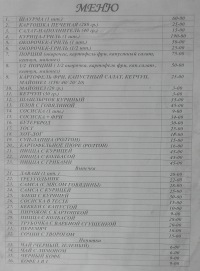 When you first get to Russia and look at a Russian menu, your brain will likely undergo a complete meltdown. They phrase things differently. They list the weights of the components for many dishes. They have different customary dishes. And things are simply organized differently. So here for your viewing pleasure, I shall provide you with a Russian menu. It's a little trickier than Moscow menus because it contains borrowed Tatar words like элеш and перемяч which even Russians don't necessarily know outside of Tatarstan. It's the menu of a little kiosk that is located not far from the building that houses the филфак of the Tatar State Humanities Pedagogical University. There was a week where I had coffee there every morning. A preview of their menu is at the right. Click on the menu to see a larger version. An English translation of the menu is below.
When you first get to Russia and look at a Russian menu, your brain will likely undergo a complete meltdown. They phrase things differently. They list the weights of the components for many dishes. They have different customary dishes. And things are simply organized differently. So here for your viewing pleasure, I shall provide you with a Russian menu. It's a little trickier than Moscow menus because it contains borrowed Tatar words like элеш and перемяч which even Russians don't necessarily know outside of Tatarstan. It's the menu of a little kiosk that is located not far from the building that houses the филфак of the Tatar State Humanities Pedagogical University. There was a week where I had coffee there every morning. A preview of their menu is at the right. Click on the menu to see a larger version. An English translation of the menu is below.
Menu
| Rubles | Dollars | ||
| 1. | Shawarma (1) | 60 | 2 |
| 2. | Baked potato (280 g.) | 25 | 0.83 |
| 3. | Side salad (40 g.) | 15 | 0.50 |
| 4. | Grilled chicken (1) | 190 | 6.33 |
| 5. | Thigh-drumstick (1) | 50 | 1.66 |
| 6. | Thigh-drumstick (½) | 25 | 0.83 |
| 7. | Plate (1 thigh-drumstick, fries, cabbage salad, ketchup mayonnaise) | 75 | 2.50 |
| 8. | ½ plate (½ thigh-drumstick, fries, cabbage salad, ketchup mayonnaise) | 50 | 1.66 |
| 9. | Fries, cabbage salad, ketchup, mayonnaise (150g, 40g, 20g, 20g) | 25 | 0.83 |
| 10. | Mayonnaise (20g) | 3 | 0.09 |
| 11. | Ketchup (30g) | 3 | 0.09 |
| 12. | Chicken shishkebab | 35 | 1.17 |
| 13. | Rice pilaf with beef | 45 | 1.50 |
| 14. | Sausage link (1) | 9 | 0.30 |
| 15. | Sausage link + fries | 34 | 1.13 |
| 16. | Sandwich | 30 | 1.00 |
| 17. | Toast | 25 | 0.83 |
| 18. | Hot-dog | 18 | 0.54 |
| 19. | Rolton noodle soup — instant | 15 | 0.50 |
| 20. | Rolton mashed potatoes — instant | 16 | 0.53 |
| 21. | Chicken pizza | 45 | 1.50 |
| 22. | Sausage pizza | 45 | 1.50 |
| 23. | Mushroom pizza | 45 | 1.50 |
| Baked goods | |||
| 21. | Lavash (1) | 20 | 0.67 |
| 22. | Stuffed triangle | 22 | 0.73 |
| 23. | Beef croissant | 28 | 0.93 |
| 24. | Chicken croissant | 25 | 0.83 |
| 25. | Large savory hole-less doughnut stuffed with chicken | 30 | 1.00 |
| 26. | Pig in a blanket | 15 | 0.50 |
| 27. | Cabbage with bacon | 10 | 0.33 |
| 28. | Potato calzone | 9 | 0.09 |
| 29. | Sausage pizza | 28 | 0.93 |
| 30. | Waffle cone with fried sweetened, condensed milk | 20 | 0.67 |
| 31. | Small savory doughnut | 16 | 0.53 |
| 32. | Sweetened farmer’s cheese pastry | 15 | 0.50 |
| Drinks | |||
| 33. | Tea (black, green) | 6 | 0.18 |
| 34. | Tea with lemon | 6 | 0.18 |
| 35. | Black coffee (coffee, sugar) | 9 | 0.27 |
| 36. | 3-in-1 coffee (coffee, cream, sugar) | 9 | 0.27 |
If you read carefully, you'll notice the same item is listed twice at different prices (#22 & #29). I still haven't figured that issue out. And considering the numbering problem on the menu, I'm guessing that they haven't figured it out either.
Мороженое
The generic word for ice cream in Russian is мороженое. In form it is declined like a neuter adjective, although they use it as a noun. Theoretically the plural forms exist, though I have not personally encountered them yet:
| Sg | Pl | |
| Nom | мороженое | мороженые |
| Acc | ||
| Gen | мороженого | мороженых |
| Pre | мороженом | |
| Dat | мороженому | мороженым |
| Ins | мороженым | морожеными |
We Americans have all heard stories of those crazy Russians buying ice cream in the dead of winter. During my first trip to Moscow in 1986, I asked my acquaintance Алёша about that:
| — Правда ли, что русские стоят в очереди за мороженым даже зимой, когда на улице минус десять градусов? | "Is it true that Russians will stand in line for ice cream even in the winter when it's ten below outside?" |
| — Правда. | "It's true." |
| — Но почему же? Ведь так холодно! | "Why in the world? I mean it's so cold!" |
| — Потому что вкусно. | "Because it tastes good." |
Oh. Well, ask a stupid question...
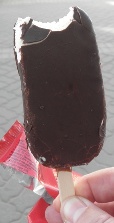
|
During the Soviet period you could mostly buy vanilla ice cream, although ice cream with a chocolate coating (эскимо) was commonly available as well. Occasionally you would see chocolate or strawberry. Nowadays they have all sorts of flavors and toppings. I had a crème brûlée (крем-брюле) ice cream the other day that was wonderful. Here are a few sample sentences: |
| — Хочешь мороженое? — Хочу. |
"Do you want ice cream?" "I do." |
| На десерт мы заказали блинчики с мороженым. | For dessert we ordered crepes with ice cream. |
| Без мороженого я не могу жить. Я его ем каждый день. | I can't live without ice cream. I eat it every day. |
| Мама всегда добавляет орешки в домашнее мороженое. | Mom always adds nuts to her homemade ice cream. |
Although мороженое is a generic word for ice cream, there is another word you have to know nowadays to be ice-cream-competent in Russia. I'll blog about it in a week or so. Your assignment: take your best guess what that word is and post it in the comment section.
Чай (часть вторая)
The Russian word for tea is чай. Russians drink a lot of hot tea, even when it's hot out. They seem to have this theory that if you drink hot tea, then you sweat, and sweat cools you down, so drinking hot tea cools you down. Don't try to argue with the logic of that. They won't buy it.
In the States if you ask someone under 30 how to make tea, they will probably tell you something like: "Put the teabag (чайный пакетик) in the cup (чашка). Pour in boiling water (кипяток). When the water changes color, pull the teabag out." If they are tea experts, they might add, "Pull out the teabag as soon as the water changes color or the tea will turn out bitter." A Russian would just laugh at that. Yes, Russians have teabags, but making tea with them is a sign of incompetence. That's right: tea-bagging = incompetence.
So how do Russians make tea? Obviously you have to start with a чайник teapot:
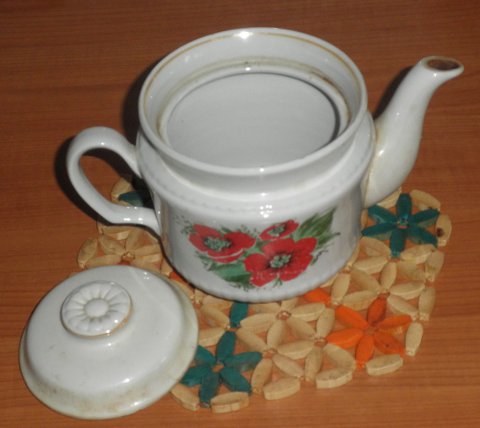
You may notice that the teapot is not the same thing as an American tea kettle. The teapot is smaller. If you rotate it, then you see that it has a built-in strainer:
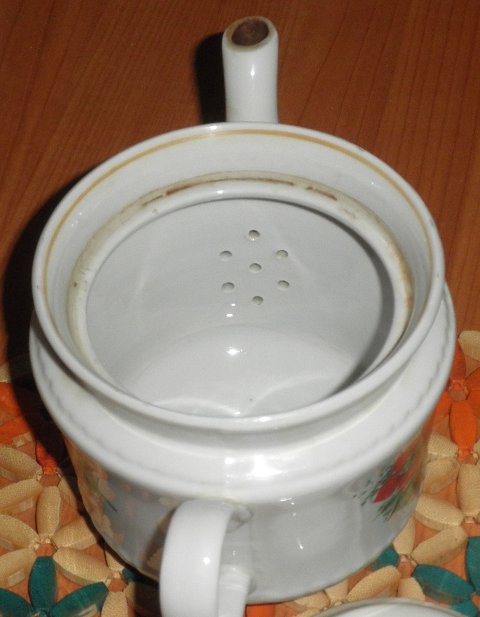
Here's how it works. You put a ton of tea in the teapot, then you add hot water. This makes a заварка, which is an intense tea brew. You then fill your cup perhaps one fourth full of the заварка:
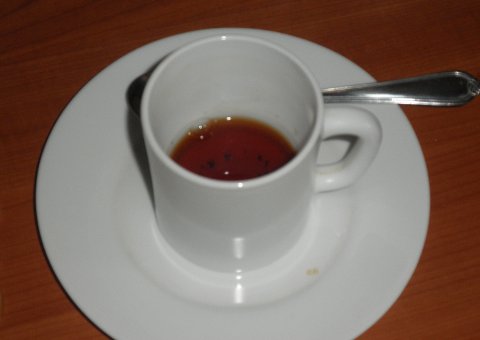
Then you take hot water out of a tea kettle which has brought the water to a temperature so hot that even the animals around Chernobyl would be intimidated:
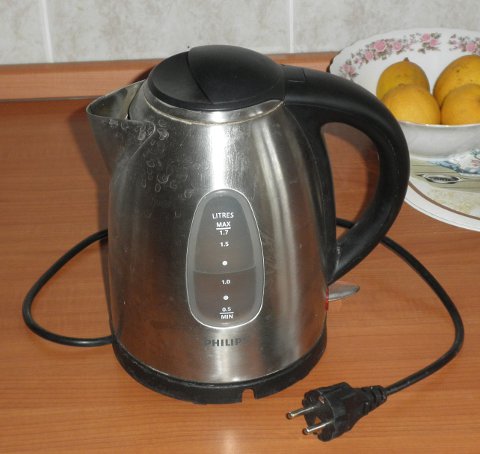
You then fill the the cup with the Chernobyl water:
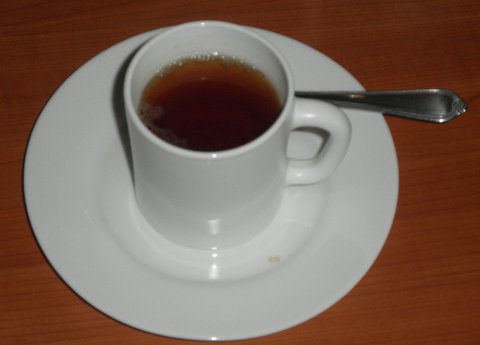
You then let it cool down a bit, say for 1.5 days (полтора дня). Then you drink the tea. And that's the proper way to make tea.
Okay, I was kidding about the 1.5 days part. But they really do heat the water up über-hot, and you really do have to let it cool a while.![]()
Бизнес-ланч
As weird as this sounds, sometimes it's the English words in Russian that confuse me, not the Russian words. For instance, all over Kazan these days there are signs on restaurants that read Бизнес-ланч "Business Lunch." "What the heck is that?" I ask the locals. They look at me as if I am an idiot and say, "Those are English words. You should understand them." Well that's just it. I do understand them. In the US a business lunch is a lunch where you do business. It's not the name of an item on a menu.¹
Nowadays in Russia a бизнес-ланч is essentially a particular menu offered at a fixed price. No substitutions, please. I think the best translation for it may be "lunch special" or what some menus lable a prix fixe meal. One of the many restaurants in Kazan that offer such meals is called "Meat House."
My students love this place because you can get meat without mayonaisse or sour cream on it. What? No mayo or sour cream, you say? It can't be run by Russians then. You are correct: the food is prepared by Turks. I was interested in the meal represented on this ad:
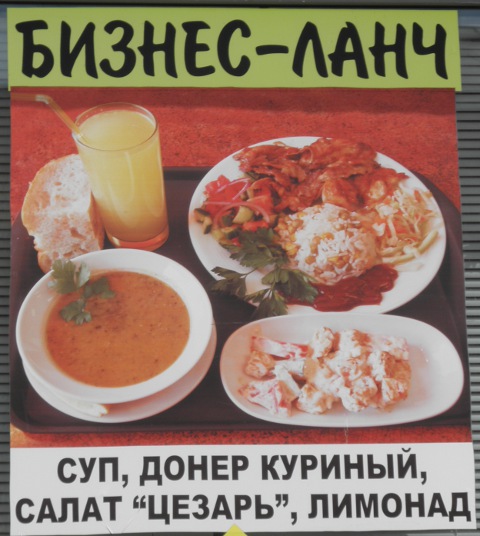
They offered it for 149 rubles, which is about 5 bucks. I decided to try it. How well did it match the advertisment? You be the judge:
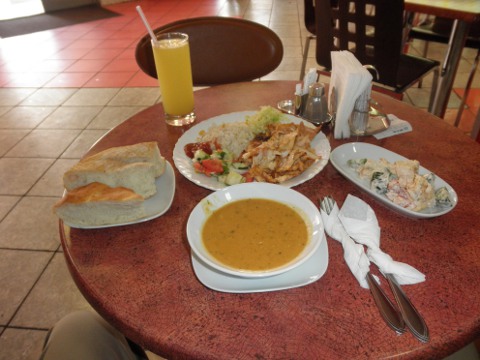
The drink is lemonade. The lentil soup could have used a bit more salt. The bread was good, but I'm not a fan of bread. The donair (Canadian spelling) is finely shaved chicken accompanied by rice and some cabbage, and the salad is made half of croutons and half of vegetables tossed in what the Russians consider a Caesar sauce, but it doesn't have the sardine flavor that an American Caesar Salad requires. Here are some sample sentence:
| — В кафе «Нептун» предлагают вкусный бизнес-ланч с морепродуктами. Не пойдёшь со мной? — Нет, я не люблю рыбу. |
"At the Neptune Cafe they offer а delicious seafood lunch special. Do you want to go with me?" "No, I don't like fish." |
| — Какой у вас сегодня бизнес-ланч? — С курицей или с мясом. |
"What's your lunch special today?" "You can have chicken or meat." |
| — Почему вы не принесли мне суп? — В нашем бизнес-ланче нет супа. — Да что вы. Бизнес-ланчей без супа не бывает. — А у нас бывает. Посмотрите на рекламу. Там нет никакого супа. |
"Why didn't you bring me soup?"' "Our lunch special doesn't have soup." "Oh, come on. There's no such thing as lunch specials that don't have soup." "There is here. Look at the ad. There isn't any mention of soup." |
| В кафе «Мит Хаус» очень вкусные блюда. Я часто туда хожу за бизнес-ланчем. | "Meat House" has really delicious food. I often go there for the lunch special. |
Business lunches, in the sense of lunches where you do business, are vital in the US. When I was preparing this blog-entry, I came across a business-lunch link from Microsoft. Apparently they consider it important enough to give some basic guideliness for the event. Read it here for your amusment.
One last grammatical comment: бизнес-ланч is a phrase that is currently in a grammatical no-man's land. Although most people decline it, as a foreign phrase it is sometimes not declined by others. The orthographic dictionary at gramota.ru treats it as declineable, so that's the best approach for a foreigner to use. In the case of the examples above, one of my current native-speaker informants sometimes declined it and sometimes didn't. If it disappoints you that the Russian language is sometimes inconsistent, then you must take advice from about 2 minutes 5 seconds into the sword fight in The Princess Bride: "Get used to disappointment."
¹ Well, this not necessarily 100% true. Probably there are some restaurants somewhere in the US that have "business lunch" written on their menu. My point here is that "business lunch" in the sense of a particular meal selection for a particular price is not a standard phrase in American English.